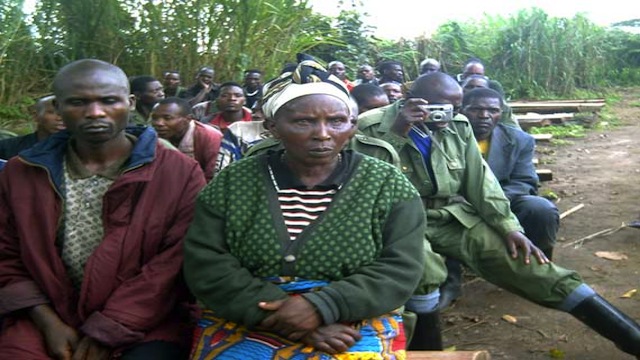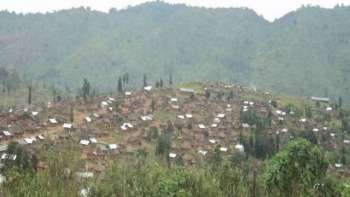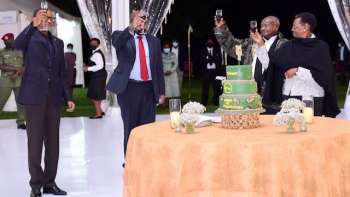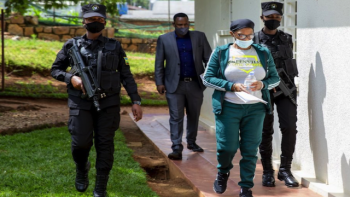A DAY OF RECKONING:
I can claim that my active interest in the Rwandan politics started on March 2, 1997. That date will remain forever engraved in my memory. In the morning of March 2, 1997 a company of Tutsi soldiers of the Rwandan Patriotic Front (RPF) army, the Rwandan Patriotic Army (RPA), encircled the villages and small towns of my origin, in Jenda, Cellule Kabatezi, Sector Nkuri, Prefecture Ruhengeri, Northwestern Rwanda.
They rounded up all Hutu men and young boys they could find, tied their arms in the back with sturdy ropes (also known as “Akandoya”, one of the torture methods in RPA arsenal) and led them into the mountains of Konoma, Rubare, and Runyanjya. Late that evening, women and a few men who by chance had escaped, heard heavy fusillades. When the fusillades ceased, the RPA soldiers descended down the mountains and left the villages.
During the night, the surviving men, conquering their fear, went to the place where the fusillades took place. The macabre scene lit by the moon could only be equaled by episodes from the scariest horror movie. Torn apart bodies of young boys and men, old and not old, lay in pools of blood, some with arms tied in the back by sturdy ropes that had eaten away the flesh. Unrecognizable and severed heads were smashed and lifeless bodies were riddled with bullets. Few of these surviving men, frozen by fear, had enough courage to burry some of the bodies before the sunrise. In the following morning the RPA troops came back with trucks and led terrified Hutu porters up in the mountains to carry the bodies and load them in waiting trucks. When the RPA troops could not find some of the bodies, they went on rampage, killing more Hutu men, torturing and executing women they suspected of knowing where the missing bodies were buried. The cleansing operations took several days. After the operations, only a few Hutu men and young boys from the villages of Jenda and the surroundings had escaped the pogrom. Several women and children, including infants, were massacred. Hutu men and young boys and women who were spared were because they either were mistaken for Tutsis or were hidden by Tutsis.
On the single day of March 2, 1997, thousands of Hutu people were systematically massacred by Rwandan Patriotic Army (RPA) troops. My close family alone lost 57 people. These are 57 brothers, sisters, cousins, nephews, nieces, uncles and aunts, and their wives, husbands or kids, who were killed by the RPA for one reason: being Hutu or suspected of being Hutu or Tutsi associated with Hutus. However, even the most brutal regime cannot annihilate an entire clan. Several more brothers, sisters, cousins, nephews, nieces, uncles, and aunts, along with their spouses or kids survived the pogrom. Some survived because they were Tutsis, or mistaken for Tutsis, others because of the flip side of the human wicked face: humanity.
This is how Human Rights Watch recounted these events in an report titled: “Rwanda: the search for Security and Human Rights Abuses, published by Human Rights Watch on April 1, 2000: “In 1997, ex-FAR and Interahamwe who had returned from the Congo and who had strengthened their forces by recruiting inside Rwanda, conducted a major insurgency in the northwestern prefectures of Gisenyi and Ruhengeri. In suppressing this uprising, as in the first Congo war, RPA troops killed tens of thousands of unarmed civilians, a slaughter which Rwandan authorities sought to justify by their need for security.”
In that period of total darkness, a dim light shone and humanity prevailed in some cases. Some Tutsis conquered their fear and risked their lives to protect some of my surviving relatives against the murderous madness of their Tutsi brothers of the RPA. My Hutu relatives who survived that day owe their lives to these courageous and selfless Tutsis. When I contacted my surviving relatives they could not tell me the story: It was too painful to relate. It is from these Tutsis that I came to know the tragic story of what happened in my village on that fateful day of March 2, 1997.
From those tragic moments, I retained the names of two individuals: the criminal commander of the Tutsi RPA company responsible for the ethnic cleansing, and one of the fearless and self-sacrificing Tutsis who stood guard in front of the shacks and caverns where some of my Hutu relatives hid for days. Sadly, RPA soldiers, when they learned that these Tutsis had protected my relatives, murdered some of them.
When I asked one of the Tutsis who saved my relatives why he did it, he simply answered: I am a Christian. I did what any good christian would do: “having the fear of God’s judgment and making amends by loving your neighbor as yourself.” He attempted to apologize on the behalf of the Tutsis but I stopped him. I explained that the horrendous crimes were not committed by Tutsis, but that criminals just happened to be Tutsis. I also gave him the example of my Tutsis relatives who were massacred in the same period.
FEARLESSNESS, A NECESSARY CONSEQUENCE OF TRUTH
The Tutsi’s answer reminded me of Gandhi’s vow of fearlessness: “When we fear God, we shall fear no man, no matter how high-placed he may be. And if you want to follow the vow of truth in any shape of form, fearlessness is the necessary consequence. And so you find, in the Bhagawad Gita, fearlessness is declared as the first essential quality of Brahmin. We fear consequences, and therefore we are afraid to tell the truth. A man who fears God will certainly not fear any earthly consequence.”
In the days following March 2, 1997 and after listening to the amazing story of the fearless Tutsis who stood guard in front of the hideout of my relatives and gave them the chance to live another day, I took two important decisions: first to honor the memory of my 57 relatives brutally murdered for their ethnicity on March 2, 1997 and second, as a tribute to the bravery and selflessness of the fearless Tutsis. These two decisions have followed me and guided my political engagement for the last 12 years:
- I will tell the truth about the Rwandan tragedy
- I will strive for fearlessness in pursuing the truth
For More see Beyond Ethnic Politics and Fear: Hutu, Tutsi, and Ethnicity in Rwanda by Felicien Kanyamibwa.
Felicien Kanyamibwa, PhD.
New Jersey, USA. March 2, 2017.


















